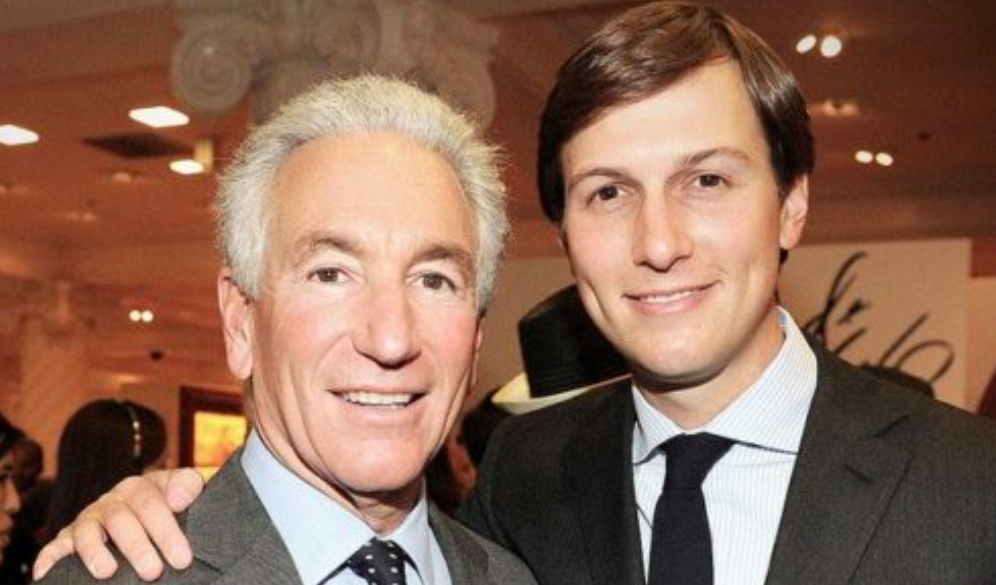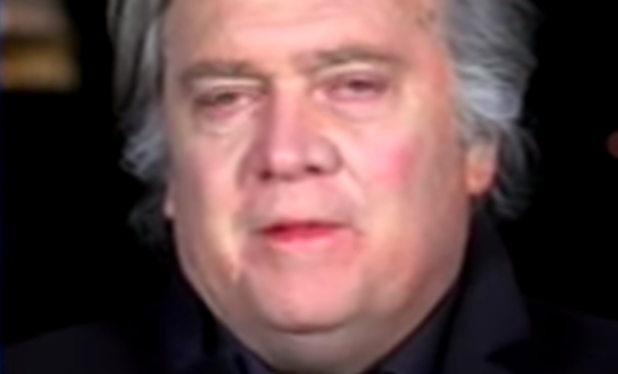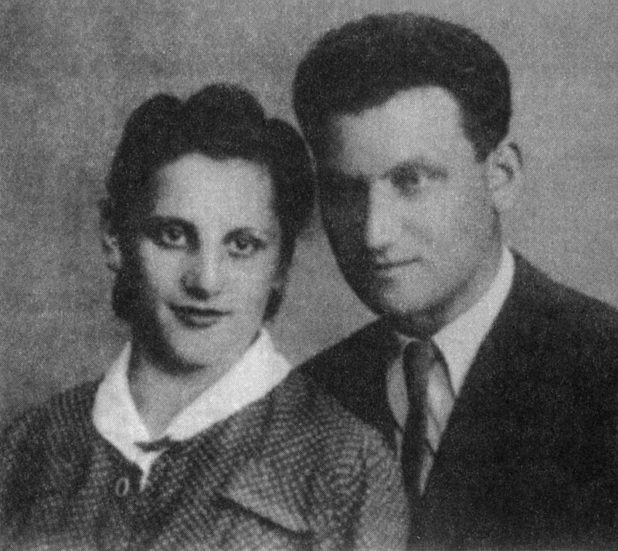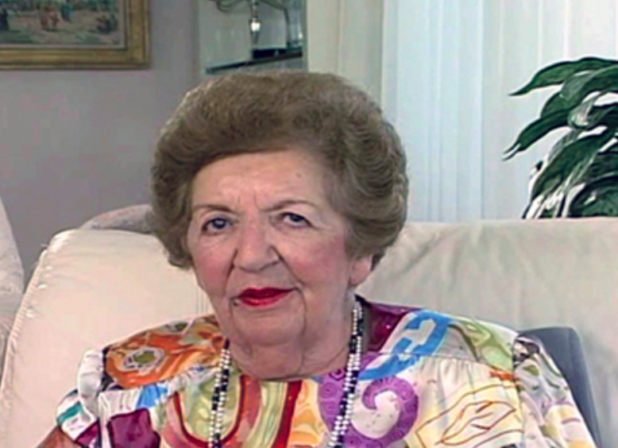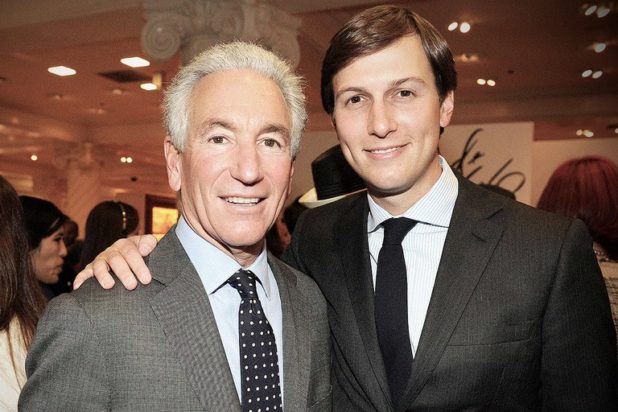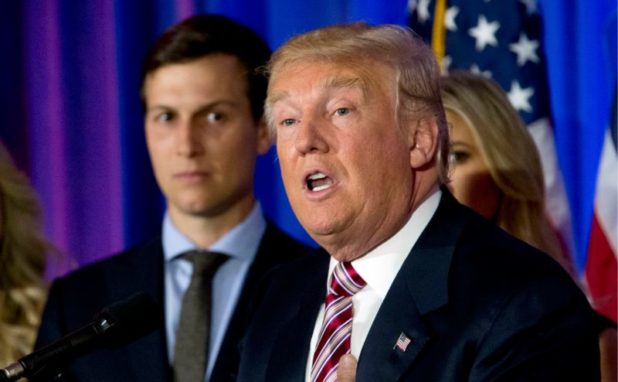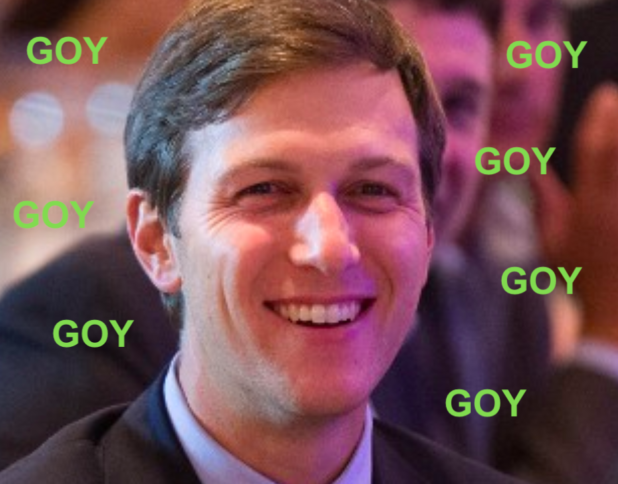Andrew Anglin
Daily Stormer
April 8, 2019
I will be doing a detailed review of the book “Kushner, Inc.: Greed. Ambition. Corruption.”, a newly released Jared Kushner and Ivanka Trump biography by Vicki Ward in a multipart series here on the Daily Stormer.
Before we get into the meat of it, I will give some general comments on the book.
With regards to the accuracy, the book is heavily sourced. There are pages and pages of book and news article sources in the back of this book. Further, several major persons went on record, including a former Kushner Company executive, Alan Hammer.
However, many of the main sources are anonymous sources, a newsmedia practice that people are rightly critical of. That said, many of them are anonymous only by technicality. Ward tacitly admitted that Steve Bannon was a big source in a recent interview with Democracy NOW!, even though he wasn’t technically on the record. He’s obviously a somewhat biased source, but biased against her own liberal agenda. So the fact that she indicated she relied heavily on him indicates she was doing her best to be objective.
The whole book reads as if she is doing her very best to be objective. Unlike the alleged investigative journalism books of Bob Woodward and Michael Wolff, you don’t even detect a political slant reading this book. (Woodward literally begins the preface of “Fear” by lecturing the reader about the importance of free trade with South Korea.)
Furthermore, it is clear from the outset that Kushner, Inc. is not simply a salacious rumors document, because virtually everything in the book is about Jews. In order to invent or indulge the things she writes in this book about the Jews, Ward would have to be a Nazilike anti-Semite, which I seriously doubt she is.
The book is written in the standard way of mass market nonfiction, which is devoid of stylized prose. Its form is designed to appeal to the lowest common denominator, so it reads like a long Reuters article. Though the language is not enjoyable, it is not vulgarly utilitarian. The prose is on par with Bob Woodward’s Trump book, but unlike with Bob Woodward’s Trump book, you’re not bogged down trying to sift through made-up bullshit. Ward’s information is arranged in a cogent manner, and it is the information itself that is the enjoyable part. I found myself laughing out loud at least once per page at how cartoonishly Jewish this family is.
The book is being marketed as an anti-Trump book, but Donald Trump is a peripheral character. This is quite simply the story of an Eastern European Jewish crime family’s successful execution of a decades old plot to undermine the US government and nation as revenge for the Holocaust. Before reading this book, I knew that Jared Kushner was an ultra-Zionist Jew, but I simply was not prepared for just how Jewish he and his people are. I will try to pull out the best quotes from the book illustrating that point, but there is no way I can go through even a percentage of the Jewish trickery, schemes, perversions and bizarre, compulsive neurosis documented in this book, so I highly recommend that everyone go purchase a copy of it.
The first sentence in this book has to do with Jews. And it just never stops from there.
This is the opening paragraph:
On almost any other Friday night, Ivanka Trump and Jared Kushner would have been at home with their three children, celebrating Shabbat. But this Friday night was different: the couple had received a rabbinical dispensation to attend the inaugural balls in Washington, D.C.
The setting then moves to DC Trump International Hotel, where Jared’s father is lecturing his younger son Josh about how he has to break up with his trophy shiksa Karlie Kloss because she isn’t Jewish.
After that introduction, which sets the stage for just how Jewish this all is, the next chapter begins the history of the Kushner dynasty.
And that history begins where all Jewish history begins: with the Holocaust.
In 1949, Jared Kushner’s grandparents, Joseph and Rae Kushner, arrived by ship in New York City, along with their infant daughter, Linda. After fleeing Poland and spending three years in a refugee camp in Italy, the Kushners were finally about to begin their new lives in America. Yet the scars the couple bore from World War II were visible in every aspect of their lives—and would also be seen in the lives of their children and grandchildren. “Everything we did was against the relief of the Holocaust,” one family member explained. “Surviving, growing, getting rich, power, politics … this was all to spite the Nazis, to spite what they did to us.”
Shockingly, the Kushner family’s escape from Germans in Poland sounds like something out of Indiana Jones.
Rae Kushner was in a ghetto with 30,000 other Jews, and she alleges that in 1943, her mother and one of her sisters were shot dead by the German Nazis, who were systematically (over the course of years) killing all the Jews in the ghetto.
Rae, along with her father, brother, and another sister, teamed up with other Jews and began to dig a tunnel out of the ghetto, hoping to reach a nearby forest. The chances of escape were minuscule, but they reasoned it was far better to die together, trying. “We had heard there were Jews in the woods who were not starving,” Rae recalled. “We could not imagine how you could live through the winter in the woods with the snow and the cold and the wet weather, but we decided that anything was better than staying here and waiting for a bullet.”
It’s amazing that out of 30,000 people in the ghetto, it was the Kushners who came up with the idea to dig a tunnel and meet up with the forest Jews.
Rae Kushner met Joseph Berkowitz in the makeshift Jewish bunker that they managed to stumble across in the woods. They developed a relationship over the nine months they were hiding out there in a hole in the ground.
When the war ended, they decided that Poland just wasn’t the same anymore, so they pretended to be Greeks and fled to Italy, where they were married in a refugee camp.
Jospeh did the modern thing and took Rae’s name. Not because he was modern, mind you. These are very orthodox Jews. He did it because she came from a much richer and more important Jewish family.
Just a hilarious note here, not included in Vicky’s book: Rae Kushner was featured in Stephen Spielberg’s “Shoah Foundation” Holocaust archive project, which served as the source material for my favorite Holocaust documentary, “Last Days of the Big Lie.”
The newlywed Kushners were in the Italian camp for three years – and Rae had a daughter during that time – before they were finally given a visa to go to America.
Thus it was that a penniless family from rural Belarus would begin the American Dynasty that would someday control the White House.
When they arrived, they landed straight in Brooklyn, where Rae popped out three more kids – for a total of two boys and two girls – and Jospeh just wandered straight into the real estate industry when he started building buildings after having taught himself how to do that.
Fortunately, due to his great carpentry skills, he was offered work in New Jersey, where his family’s empire would be based.
The Kushners became part of a group of Holocaust-surviving Jewish real estate families that were referred to as the “Holocaust Builders.” The Jews were transforming lovely agricultural land in New Jersey into suburban ghettoes at an alarming rate.
Regrettably, Holocaust Builders do not have a good reputation.
A 1980 series in The Times of Trenton noted that some of the Kushner-owned construction projects “brought criticism and lawsuits over allegedly faulty construction or inadequate upkeep of apartments.” Some of the buildings in one development were lopsided. In another, the grading was off, so backyards flooded when it rained.
But at least they stuck to good old-fashioned Jewish family values.
The flip side of that tight familial bond was a deep mistrust of outsiders, not only non-Jews, but also assimilated or secular Jews. Joe and Rae’s wartime experience created a sense of exceptionalism that was both good and bad, according to one Kushner, who talked to me on the strict promise of anonymity for fear of reprisal from a family known to be as punitive as it is private. The family mantra is “Think like an immigrant, act like an immigrant,” this person said. “But what does that mean?”
“The Kushners’ experience was unusual in the sense that … they were fighters,” explained Jewish scholar and historian Michael Berenbaum, who knew Rae. Their “experience was not a passive victimization, but an active attack on the enemy, and thwarting the enemy.… You didn’t survive being a [fighter] without being tough as nails.” A person in that situation grew up being taught that rules are for other people. “You don’t wait for the Nazis to come liquidate you. You build a fucking tunnel and get out of the ghetto.… You don’t wait for the bastards at Harvard to let you in. You make it yourself into Harvard,” the family member said. According to Berenbaum, the Kushners would have not been alone among Holocaust survivors in feeling this way. For those people, he explained, “rules are dangerous.”
This is the entire theme of the family: “to take revenge on the Nazis, we must do whatever we need to do to screw over whoever is around us and not doing so will destroy us.”
I think that is basically the logic of all Jews.
Joe nurtured competition between his eldest, Murray, and Charlie, Jared’s father.
Charlie was intent on ascending to the throne of the Kushner empire, and when his older brother’s wife died of breast cancer, he took a shot at him while he was down.
Murray remarried to a non-religious Jew, Lee Serwitz, and Charlie used that to defeat him.
Charlie smartly married a very religious woman, and she helped him destroy his brother’s standing in the family.
In his romantic life, Charlie went in the opposite direction. Seryl Stadtmauer was a beautiful brunette from an Orthodox family in the Far Rockaway neighborhood of Queens, New York. She and Charlie had met in their teens. When they married, Charlie became more observant to appease both his wife and his skeptical father-in-law.
…
Seryl remained the more religious of the two, and it became evident she found her sister-in-law’s relaxed attitude toward her faith vexing. Lee had no idea how to keep a kosher household, for example, so Seryl, who lived closer to her than any of the others in the family, would pop over to educate her. Despite this, or maybe because of it, the two women never got on. “Seryl was just really fucking mean,” one person who is close to Lee said. At first, Lee tried to brush her ignorance off as a joke. She would tell her friends that when Seryl said to her, “Shavua tov”—Hebrew for “have a good week”—Lee responded, as if Seryl had sneezed, “Bless you.” But the underlying friction was anything but funny. In fact, it would be the wedge that would help split the brothers.
In 1985, having officially secured his position as head of the family, Charlie opened the first offices of Kushner Company. Joe Kushner died before he was able to see the second, much more grand office.
As the company expanded, Charlie kept it incestously Jewish, and used that incest, Jew situation to abuse his friends and extended family.
Hiring relatives and friends—members of the Livingston shul (synagogue) and the Hebrew Academy—became a typical Charlie practice, one that occasionally backfired. He hired his brother-in-law William (Billy) Schulder—Esther’s husband—only to discover him having sex on the conference room table with the office bookkeeper and chief financial officer, Marci Plotkin. (Plotkin said this was “an outright lie.”) Charlie fired Schulder and Plotkin, a ferociously hard worker, but kept her close (and quiet) by getting her a job at Schonbraun, Safris, McCann, Bekritsky & Co., the accounting firm Kushner Companies used. Of course, the knowledge of what had happened gave him leverage over both of them. Viewed one way, hiring your friends and family is an act of generosity. But it also meant Charlie held “ownership” over all his extended relatives and neighbors, which meant he could treat them however he pleased. And he did.
Charlie’s business practices are described as reckless and ridiculous, but he always made money – somehow.
Jared was his eldest, and Charlie chose him to be his heir. His brother Josh was less serious and his other two children were female.
“I want to be the most powerful Jew in America,” Ward quotes Charlie as having told a business associate.
And that’s exactly what he did.
Charlie began funding politicians, including Chuck Schumer and Hillary Clinton. Beginning in the mid 1990s, he started engaging in large scale fraud so he could pour money into this agenda.
A Kushner family member is quoted as saying: “[Charlie] had a messianic complex. It was his father who delivered us from Poland, and [Charlie] was going to deliver us to Manhattan. He’s going to get us out of New Jersey and onto the Forbes 500 list. But to do that … you’ve gotta buy [Governor] Jim McGreevey.”
Kushner-owned McGreevey won the election for governor of New Jersey in 2001.
Charlie was also aggressively ripping off his siblings as part of his power-grabbing agenda.
All of the LLCs passed down by Joe Kushner were, per the instructions of his will, equally divided among Charlie and his three siblings, and their respective children’s trusts. But Charlie set up a management company, Westminster Management, and made himself the manager of all the buildings.
…
He invited politicians to speak (often for a large fee) in an assortment of venues, ranging from his office to his home, off-site conferences, and his synagogue. (He even invited the entire New Jersey political leadership to attend a Kushner baby’s bris.) A speech by Israeli Prime Minister Benjamin Netanyahu, for example, cost as much as one hundred thousand dollars, and Charlie paid him to speak in New Jersey four times.
There is some detail in the book about the various tax swindles Charlie Kushner was running, taken from court documents. It’s fascinating stuff. Basically, they would write off expenses from one project on another project’s taxes. Apparently, the company’s written records were so fraudulent that senior executives started using a secret letter code to try and mark falsified expenses so they could maintain some understanding of the actual performance of properties.
The vitriolic way in which the Jews are portrayed as interacting with one another is extremely enlightening and hilarious.
Stadtmauer and Charlie’s mantra was that there must be no paper trails, no record of what they were doing. Stadtmauer frequently reminded Zecher to be careful what he put in emails. One time, according to court records, an interim CFO, Alan Lefkowitz, sent an email asking if he should pay for the construction of a local mikvah with funds from one of the partnerships. Charlie went berserk. He printed out the email and handwrote on it, “This guy is a definite moron. We must deal with the situation.” (Lefkowitz would soon be barred from the Tuesday meetings; he later resigned because he wasn’t willing to go along with the firm’s creative accounting.)
Lefkowitz was not the only person to find the culture of the firm unpleasant, according to another former employee. “Charlie ran the place like a dictator,” this person said. He also noted that the brutal office conditions were at odds with the image of a pious, Orthodox Jewish firm presented to outsiders. (One person remembered the scurrying that was done, to appear to be a religious firm should a rabbi or someone Orthodox stop by, was almost comical. “All of a sudden, the religious books would come onto the table, [Charlie] would put on a yarmulke, and they would wait there and make it look as if they are religious Jews.”)
Despite his professed liberal political views, Charlie was apparently not a big believer in diversity. Everyone at the firm was Jewish, except for some of the administrative staff, several of whom were attractive white women, hired, so it was thought by at least one senior executive, for their looks.
…
The Tuesday meetings became known as the “Tuesday beatings.” No one was supposed to go to the restroom during one, even though the meetings could run as long as three hours. And anything could set Charlie off. One time he was livid that someone was using a Montblanc pen—made in Germany—and accused that individual of bringing “Nazi paraphernalia into his home.”
…
Stadtmauer got beat up by Charlie more than anyone else. In one of those Tuesday meetings, Charlie accused Stadtmauer of being anti-Semitic because he drove a Lincoln Continental. (Henry Ford, whose Ford Motor Company introduced the car in 1939, was a notorious anti-Semite.)
Jared Kushner is so Jewish that Bibi Netanyahu would literally sleep in his bed (Jared would sleep in the basement). Bibi would be invited over to the Kushner home by Charlie, and Jared would be in all the discussions.
Funny how the leader of Israel would be comfortable getting so close to an organized crime family.
Jared is also so Jewish that he got into Harvard in the standard Jewish way.
Around the time Jared was applying to colleges, Charlie pledged $2.5 million to Harvard and made additional promises to Princeton and Cornell. He also got New Jersey Senator Frank Lautenberg, who was an investor in at least one of his projects and to whom Kushner Companies had donated more than two hundred thousand dollars, to make a call to Senator Ted Kennedy, who, in turn, phoned Harvard’s dean of admissions. When Jared was accepted at Harvard, his high school teachers were aghast, alternating, according to a student, between disbelief and disgust.
Man, it sure is easy being Jewish.
Can you imagine?
In Part II of this review, we will look at the book’s analysis of the fall of the Charlie Kushner criminal empire.
